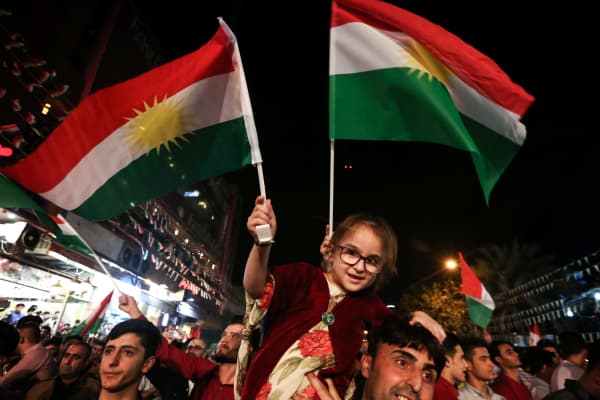
An oil-rich province in the north of Iraq plans to vote in a referendum on Kurdish independence later this month, prompting fears of regional conflict as tensions escalate over who owns a portion of the country's crude.
Kurdish forces have been in complete control of the province of Kirkuk — as well as other disputed areas — since the summer of 2014, when so-called Islamic State swept across parts of Iraq. In addition to being home to much of Iraq's oil, the northern part of the country forms part of Kurdistan, the unofficial but centuries-old home of the Kurdish people. The Kurds have long sought their own state and began to believe it was near their grasp after American troops overthrew Saddam Hussein's Iraqi government in 2003.
Both Iraqi government troops and Kurdish militia forces have fought to drive ISIS out from most of the country over the past two years, but now the long-running dispute between Baghdad and the Kurdish capital of Erbil over who should claim the spoils is sharpening.
The referendum, due to be held on September 25, is vehemently opposed by Baghdad, with Prime Minister Haider al-Abadi describing the vote as "unconstitutional and illegitimate."
On Tuesday, Iraq's central government authorized the prime minister to "take all measures" to preserve the country's unity. Iraq's Kurdish leader, Massoud Barzani, rejected the notion that the vote endangered the nation's identity and vowed to press ahead with the referendum.
"In Kirkuk especially, Baghdad will not accept a scenario in which all of the territories are annexed," Ayham Kamel, director for Middle East and North Africa at consulting firm Eurasia Group, told CNBC via phone interview.
More than 6 million Kurds are estimated to live in
Iraq — amounting to around 20 percent of the total population — with
most situated in the landlocked northern region.
With the 5 million Kurds who are eligible to vote largely united by dreams of self-determination, the outcome appears in little doubt.
The Kurds have been pursuing an independent state since at least the end of World War One, when colonial powers divided up the Middle East between modern-day Turkey, Iran, Iraq and Syria — splitting the Kurds' territory between those nations.
Western governments, including Germany, oppose September's Kurdish referendum, arguing the vote will undermine the fight against ISIS and escalate tensions with Baghdad. But it does have the support of Israel, which regards the Kurds as a buffer against Iran and Arab nations. The United States also opposes the referendum, though the Kurds have been a critical ally for the U.S. going back at least to the Iraq War.
With the 5 million Kurds who are eligible to vote largely united by dreams of self-determination, the outcome appears in little doubt.
The Kurds have been pursuing an independent state since at least the end of World War One, when colonial powers divided up the Middle East between modern-day Turkey, Iran, Iraq and Syria — splitting the Kurds' territory between those nations.
Western governments, including Germany, oppose September's Kurdish referendum, arguing the vote will undermine the fight against ISIS and escalate tensions with Baghdad. But it does have the support of Israel, which regards the Kurds as a buffer against Iran and Arab nations. The United States also opposes the referendum, though the Kurds have been a critical ally for the U.S. going back at least to the Iraq War.
"Regional interference could serve to raise tensions and potentially ignite conflict, rather than dampen down the chances."
Source: CNBC
No comments:
Post a Comment